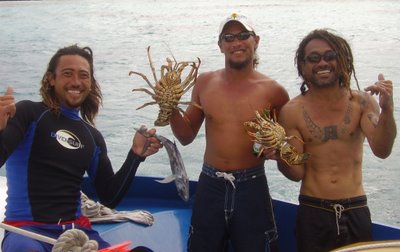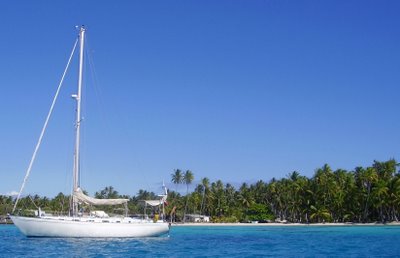We were really enjoying Raroia. There wasn't much ashore, a small village, population approx 80, but there was a lot of activity; fishing and pearl farming, spear throwing contests, volleyball, football and general hanging about especially around the ever active barbeques. Not to mention we were the only yacht in the atoll - which gave us a certain novelty value; we'd made an effort to visit one of the less frequented islands and escape briefly from the main yacht route from Marquesas to Tahiti. We'd met a few locals when they'd asked if we had any MP3 music they could copy onto their iPods. Ellen was a little envious as they had super-slim iPods unlike her earlier model. Amazingly they seemed to enjoy our music collection, although discerningly chose mainly from Ellen's library which I guess, won't come as a surprise to some of you.
Even though we were surrounded by fish, we were reluctant to try to catch any as we we'd heard ciguatera (fish poisoning) was prevalent in the lagoon. As we finished the last of our tuna, it was starting to looking as though we'd have to be creative with our surplus of onions, pasta and cans of tomatoes. Fortunately we were saved from the remains of our stores by the offer of an afternoon's spear fishing.
Five of us headed out in a fishing/speed boat initially in search of lobster. Much grovelling around in holes in the exposed coral later and we had two good sized lobsters in the boat. Then we moved to the pass for the spear fishing. It was a revelation; our hosts effortlessly descended, slowly took aim and without fail brought up their speared fish to the waiting boat. My efforts were sad in comparison; vigorous thrashing around as I dived down, by which time I'd expended too much energy, so I only had enough time for a hurried aim at the now rapidly disappearing fish, followed by a swift ascent and a good few minutes recovery. The result - I'm still looking forward to spearing my first fish, but at least I now know what I'm 'aiming' for.
We invited our new fishing friends back to Kika and good evening followed, despite conversation slowed by frequent recourse to the French dictionary.
However during the evening the wind changed direction to the east and increased, exposing the anchorage to the 6 mile fetch across the lagoon and meaning we were anchored just off a lee shore. Our fishermen friends assured us that the wind would soon drop, which initially proved true.
However by 10pm the wind returned strongly, but the anchor seemed to be holding so we turned-in for the night. Just before midnight, after failing to sleep as we listened to the sound of the chain grating on the bottom, we heard a new noise, not coming from the anchor chain but from Kika. The anchor had dragged and we were grating against a coral head. We quickly started the engine and tried to motor forward, but the anchor was wrapped around some coral and the chain was straining at right angles to the bow, preventing us from motoring clear. Our movement was restricted and wherever we shone the torch we could see coral. There appeared to be no way clear. As we pitched in the waves we could hear and feel the coral scraping the keel. We decided the only thing to do was to ditch the anchor, break free and try to get out into open water as best we could. Ellen helmed using the engine to try to keep her off the coral but it was impossible. I set about jettisoning the anchor and chain. It seemed to take forever but eventually we broke free and then tried to find a path through the coral heads with the torch. It was a nightmare - we'd dragged through the anchorage and into a maze of coral. The sound and feeling of her hitting the coral, the screaming of the engine, the howling of the wind, and the beeping of the depth gauge telling us we had no depth, were sickening. At one point, Kika was leaning over with her port side on the coral and we were completely grounded, but eventually we worked our way clear. I checked we weren't taking on water - thankfully the bilge was as dry as normal, although I gave myself a fright when I saw what I took to be oily bilge water on the cabin sole and suspected the worse; thankfully it turned out to be a peach cordial bottle rolling around and leaking its contents. Then we settled down to a night of motoring slowly between two lit navigation marks which we knew where in safe water. Our two spare anchors were on standby in-case the engine faltered but in the event our trusty diesel clearly recognised the severity of the situation and behaved faultlessly.
With the arrival of dawn our priorities were to inspect the hull and retrieve the abandoned anchor. We waited for a let-up in the weather, but with no let-up and no alternative sheltered anchorage we felt we had little option other than to continue motoring back and forth between the two marks hoping for a clear break. Our spare main anchor comprises of 20m of chain and 40m of nylon rode. We were concerned that if we re-anchored in our former spot the coral would make short work of the nylon and we'd be fighting to save Kika again. Fortunately the clouds briefly lifted and enabled us to con for alternative anchorages. We spotted one in the lee of a large patch of coral, which appeared to have a sandy bottom and was further off-shore, giving us longer should the nylon rode chafe through.
Finally, after 12 hours of motoring back and forth, we re-anchored, holding our breadths until the anchor had clearly taken. We still didn't feel terribly secure; we were pitching and jerking horribly on the anchor line in the nasty short chop created by the 20-30 knot winds. Then the moment I hadn't been looking forward to - diving in to inspect the hull. There are plenty scratches and a few gauges below the water-line, the rudder has a few scratches but there appeared to be no structural problems which would stop us leaving the atoll.
Then to recover the anchor. Ellen waited on Kika monitoring our spare anchor, ready to motor clear should it fail, while I headed off in the dinghy towards the buoy I'd attached to the end of the chain. It was hard work recovering the ground-tackle. The chain was wrapped in a figure of eight round a couple of coral heads fortunately and unfortunately shallow enough to easily dive and free. Eventually 75m of chain and our 45lb anchor were in the dinghy, which was now overloaded, making the return journey difficult as the surf threatened to overwhelm our normally dry inflatable. By the time I'd made it back to Kika, the dinghy was worryingly awash, but it was starting to look like the worst was over.
At 4pm we cleared the churning water of the lagoon pass, hoisted the sails and cut the engine - it was such a relief to be back in deep water, enjoying the wind, not dreading it.
We're off in search of a more sheltered anchorage, in another atoll - Fakarava, where we'll rest and plan our next moves. We'll almost certainly take advantage of the haul-out facilities in the Society Islands to restore Kika to her former self and we're both still trying to make sense of what's happened and what we could have done differently.
Final thought: the expression - "you're in deep water" - isn't normally a place you'd like to be; for us it's a joy.
Subscribe to:
Post Comments (Atom)



1 comment:
Nick & Ellen, sounds like you handled it amazingly well! The story was getting too nice and laid back - a bit of drama but hopefully just this once. I'll fall asleep with the image of your dinky dinghy with a 45lb anchor aboard!
Take care dudes!
Bri Mac
Post a Comment